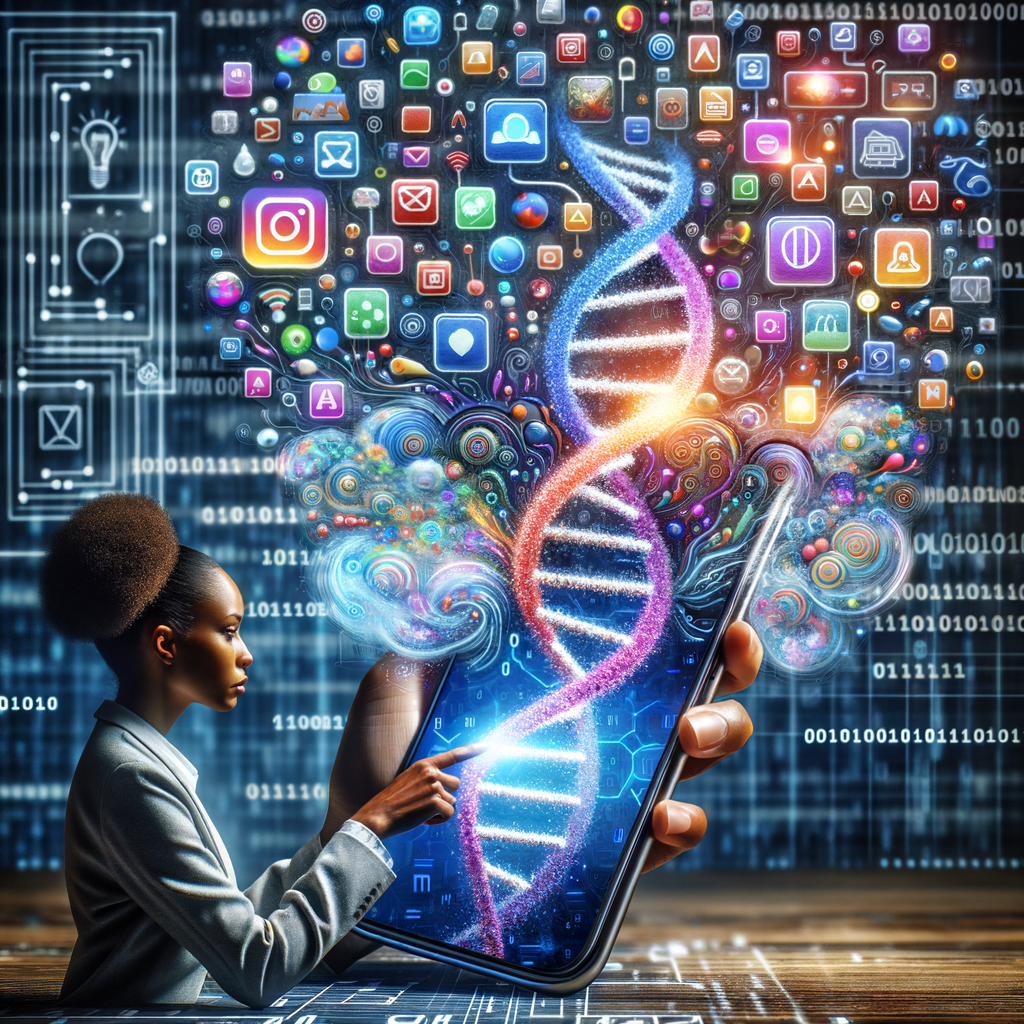
AI In Mobile App Design: Stunning Benefits For Developers
- Understanding AI’s Impact on Mobile App Design
- Streamlining Development Processes
- Enhancing User Experience
- Data-Driven Decision Making
- Adaptive Interfaces
- Reducing Development Costs
- Improved Accessibility Features
- Innovation in Design
- User Feedback and Engagement
- Predictive Analytics for Future Development
- Conclusion: The Future of Mobile App Design
- FAQs
- 1. How does AI improve the design process for mobile apps?
- 2. Can AI help optimize user experience?
- 3. What cost benefits does AI bring to mobile app development?
- 4. How does AI enhance accessibility in mobile apps?
- 5. Can AI assist in gathering user feedback?
- 6. What is predictive analytics in mobile app design?
- 7. Are there risks associated with using AI in app design?
- 8. How can developers select the right AI tools for their projects?
- 9. Is AI technology expensive to implement for mobile app development?
- 10. What trends are on the horizon for AI in mobile app design?
- References
Understanding AI’s Impact on Mobile App Design
The mobile app landscape evolves rapidly, demanding innovation and efficiency. At the heart of this evolution, Artificial Intelligence (AI) emerges as a powerful ally for developers. It streamlines the design process, enhances user experience, and creates unparalleled opportunities for creative solutions. By integrating AI into mobile app design, developers can achieve remarkable outcomes.
AI empowers mobile app developers by automating routine tasks, analyzing user data, and even predicting user preferences. This technological shift not only saves time but also allows developers to focus on more strategic aspects, like enhancing the app’s usability and aesthetics. The fusion of AI in mobile app design isn’t just a trend; it’s a game-changer. Let’s expand on the stunning benefits developers can harness through AI.
Streamlining Development Processes
AI significantly automates many steps in the app design process. For instance, by utilizing AI-driven tools, developers can effortlessly generate app layouts and select design elements. These tools analyze popular trends and user preferences, ensuring that your app resonates with your target audience right from the start.
With AI, the need for extensive A/B testing can diminish. AI algorithms can provide insights based on user interactions, assessing which designs yield better engagement rates. Developers can receive feedback in real-time, enabling them to make swift adjustments. Consequently, this agile approach cuts down on development time and costs while delivering superior apps.
Enhancing User Experience
User experience (UX) plays a vital role in the success of any mobile app. AI enhances UX by personalizing interactions. For instance, AI can analyze user behavior to tailor content and functionality. When users feel like an app understands their needs, they’re more likely to engage with it regularly.
Moreover, AI can anticipate user actions. For example, predictive text or auto-complete features simplify navigation and streamline the decision-making process. These features reduce friction, leading to a smoother overall experience. The more intuitive the app feels, the more likely users are to stick around.
Data-Driven Decision Making
In the age of information, data reigns supreme. AI enables developers to sift through vast amounts of user data efficiently. By utilizing machine learning algorithms, designers can identify patterns and trends that would otherwise go unnoticed. This data-driven approach helps in crafting features that align perfectly with user needs and preferences.
For instance, analyzing user feedback can reveal pain points or areas for improvement. Instead of relying solely on intuition, developers can base their decisions on concrete evidence. Consequently, designs become more user-centered, fostering greater satisfaction and retention rates.
Adaptive Interfaces
One of the remarkable features of AI in mobile app design is the development of adaptive interfaces. These interfaces evolve based on user interactions. AI algorithms can modify the layout and features based on how users engage with the app. This flexibility ensures that each user’s experience is tailored and relevant.
Adaptive interfaces do more than just personalize; they enhance usability. For example, if a user frequently accesses a particular feature, the app can prioritize its visibility. This design evolution keeps the interface clean and focused, making it easier for users to find what they need quickly.
Reducing Development Costs
While integrating AI may seem costly upfront, it often leads to significant savings in the long run. By automating repetitive tasks, developers can redirect their time and resources toward creative solutions that require human touch. AI-driven designs lead to fewer errors, minimizing the need for extensive revisions.
Additionally, understanding user behavior through data analysis can prevent costly missteps. Developers can design features that genuinely meet user needs, reducing the chances of creating functionalities that users don’t want. This proactive approach directly contributes to cost savings and better ROI.
Improved Accessibility Features
AI plays a pivotal role in making mobile apps more accessible. With AI-driven tools, developers can design apps that accommodate diverse user needs. For example, AI can provide voice recognition features, enabling hands-free navigation. This is particularly beneficial for users with visual impairments.
Moreover, AI can adapt text sizes or image contrasts to suit individual preferences. By understanding user preferences, apps can become more inclusive. This not only expands the user base but also enriches the overall app experience, allowing more people to engage with the app effectively.
Innovation in Design
AI fosters a culture of creativity and innovation during the app design process. By analyzing current design trends and user feedback, AI tools enable developers to experiment with new design concepts. The outcome can lead to unique interfaces that stand out in a competitive marketplace.
Furthermore, AI tools assist in generating multiple design variations, allowing developers to explore various aesthetics quickly. This rapid prototyping encourages a creative mindset, facilitating an environment where groundbreaking ideas can flourish. The results often lead to fresh, innovative applications that captivate users.
User Feedback and Engagement
Understanding user feedback is critical to the success of any mobile app. AI tools can collect and analyze feedback seamlessly, providing developers with actionable insights. Rather than waiting for users to report issues, AI can identify potential problems before they escalate.
With AI-driven chatbots, developers can engage users in real-time. This immediate interaction fosters a sense of community and allows developers to gather valuable insights. By addressing user concerns promptly, developers can enhance satisfaction and loyalty, resulting in greater long-term success.
Predictive Analytics for Future Development
One of the most exciting aspects of AI in mobile app design is predictive analytics. AI analyzes user behaviors and trends to forecast future actions. This capability allows developers to create features that preemptively meet users’ needs.
By harnessing predictive analytics, developers can also identify potential market shifts. This insight equips them to adapt their strategies proactively. Rather than reacting to trends after they occur, developers can stay one step ahead, ensuring their app remains relevant and competitive.
Conclusion: The Future of Mobile App Design
As AI technology continues to evolve, its role in mobile app design will only grow stronger. Developers who embrace AI will enjoy numerous advantages, from streamlining their processes to enhancing user experiences. The possibilities are vast and exciting.
Incorporating AI into mobile app design not only improves efficiency but also elevates creativity. Developers can create captivating, user-friendly applications that stand out in a crowded market.
The integration of AI isn’t just beneficial; it’s essential for any developer aiming for success in the mobile app industry. As technology progresses, those who adapt will thrive, ensuring their apps remain at the forefront of innovation.
FAQs
1. How does AI improve the design process for mobile apps?
AI automates tasks, analyzes data, and predicts user behavior, which enhances efficiency and creativity in the design process.
2. Can AI help optimize user experience?
Yes, AI personalizes user interactions, predicts user actions, and simplifies navigation, leading to an improved overall experience.
3. What cost benefits does AI bring to mobile app development?
AI reduces development time, minimizes errors, and helps in making data-driven decisions, ultimately lowering overall development costs.
4. How does AI enhance accessibility in mobile apps?
AI provides features like voice recognition and adaptive text sizes, making apps more accessible to users with varying needs.
5. Can AI assist in gathering user feedback?
Absolutely! AI can analyze user feedback in real-time, allowing developers to address concerns and make informed improvements quickly.
6. What is predictive analytics in mobile app design?
Predictive analytics involves using AI to analyze user behavior and trends, allowing developers to forecast future needs and adapt features proactively.
7. Are there risks associated with using AI in app design?
While AI offers many benefits, it can also lead to over-reliance or privacy concerns if user data isn’t handled properly.
8. How can developers select the right AI tools for their projects?
Developers should consider their specific needs, explore available tools, read reviews, and even test various options to find the best fit.
9. Is AI technology expensive to implement for mobile app development?
Initial costs may be high, but the potential for long-term savings and enhanced productivity usually offsets these costs over time.
10. What trends are on the horizon for AI in mobile app design?
Future trends may include enhanced personalization, better integration with Internet of Things (IoT) devices, and more focus on ethical AI practices.
—
References
1. Artificial Intelligence in Mobile Application Development
2. The Role of AI in Enhancing User Experience
3. Automating Mobile App Design with AI
4. Understanding Predictive Analytics
5. Accessibility Features Enabled by AI

